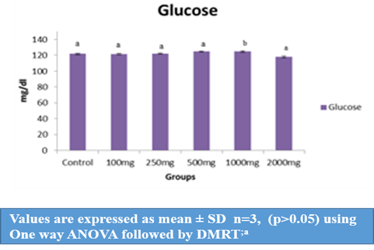Abstract
Sida acuta burm.f belongs to Malvaceae, the mallow family and enjoys tropical and pantropical distribution. The plant is usually known as wireweed in the countryside, and it is highly medicinally valued traditionally and ethnobotanically promised. The present study is concerned with acute and subchronic toxicity evaluation of ethanolic extract of Sida acuta Burm.f leaves in Wistar albino rats. Acute toxicity evaluation was conducted for 14 days. Acute doses of 100, 250, 500, 1000 and 2000 mg/kg BW were administrated to test groups of animals under consideration on the first day of experimental evaluation with three animals in each of total six groups along with control. For the remaining 13 days, animals were observed for noted behavioural changes and body weight were recorded respectively for 7th and 14th day of experimental analysis. At the end of the trial period, all the animals were euthanised, and various biochemical parameters and histopathological examination were carried out to assess the toxicity of extract. The present study revealed that the ethanolic extract of Sida acuta Burm.f leaves is non-toxic up to 2000mg/kg body weight. Subchronic toxicity evaluation was conducted for 28 days with several doses 100, 200, 300, 400 and 500mg/kg BW. Control rats without any treatment were maintained during the entire period of experimental analysis. The results of subchronic toxicity parameters indicate no significant changes to the biochemical parameters (glucose, urea, uric acid, creatinine, AST, ALT and Cholesterol) haematological and histopathological observation in comparison to the control groups. Based on subchronic toxicity parameters data, effective doses (200 and 400mg/kg BW) is determined for further cancer (colon) study in Wistar albino rats.
Full text article
Authors

This work is licensed under a Creative Commons Attribution-NonCommercial-NoDerivatives 4.0 International License.

